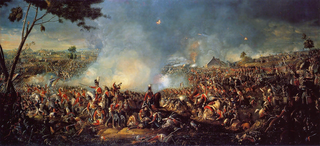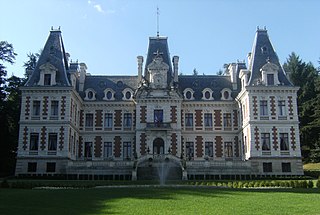
Corrèze is a department in south-western France, named after the river Corrèze which runs though it. Its capital is Tulle, and its most populated town is Brive-la-Gaillarde.
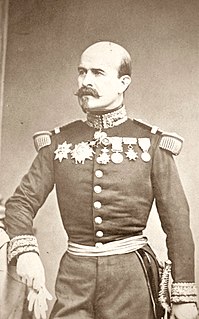
Louis-Jules Trochu was a French military leader and politician. He served as President of the Government of National Defense—France's de facto head of state—from 4 September 1870 until his resignation on 22 January 1871.

Aimable-Jean-Jacques Pélissier, 1st Duc de Malakoff, was a Marshal of France.

Charles Pierre François Augereau, 1st Duc de Castiglione was a soldier and general and Marshal of France. After serving in the French Revolutionary Wars he earned rapid promotion while fighting against Spain and soon found himself a division commander under Napoleon Bonaparte in Italy. He fought in all of Bonaparte's battles of 1796 with great distinction. During the Napoleonic Wars, Emperor Napoleon entrusted him with important commands. His life ended under a cloud because of his poor timing in switching sides between Napoleon and King Louis XVIII of France. Napoleon wrote of Augereau that he "has plenty of character, courage, firmness, activity; is inured to war; is well liked by the soldiery; is fortunate in his operations."
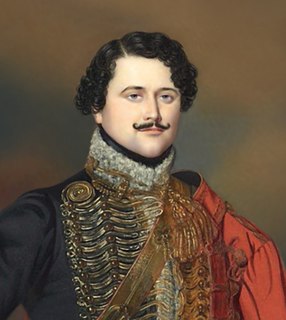
Jean-Baptiste Antoine Marcellin Marbot, French soldier, son of General Jean-Antoine Marbot (1754–1800), who died in the defence of Genoa under Masséna, was born at La Riviere (Correze). His elder brother, Antoine Adolphe Marcelin Marbot, was also a military man of some note.
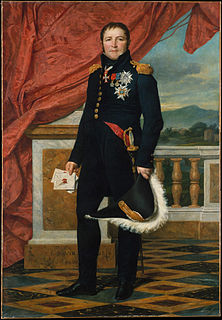
Étienne Maurice Gérard, 1er Comte Gérard was a French general, statesman and Marshal of France. He served under a succession of French governments including the ancien regime monarchy, the Revolutionary governments, the Restorations, the July Monarchy, the First and Second Republics, and the First Empire, becoming Prime Minister briefly in 1834.

Jean-Baptiste Drouet, Comte d'Erlon was a marshal of France and a soldier in Napoleon's Army. D'Erlon notably commanded the I Corps of the Armée du Nord at the battle of Waterloo.

Quercy is a former province of France located in the country's southwest, bounded on the north by Limousin, on the west by Périgord and Agenais, on the south by Gascony and Languedoc, and on the east by Rouergue and Auvergne.

The Marbot family originated from the province of Quercy, near what is now the department of Corrèze in south-western France. It is of noble origin, although its members do not precede their names with any title.

Major-General Sir Marie-Joseph-Eugène Fiset was a Canadian physician, military officer, Deputy Minister of Militia and Defence, Member of Parliament, the 18th Lieutenant Governor of Quebec, and the 3rd Canadian Surgeon General.

Louis Marie Baptiste Atthalin, Baron Atthalin ) was a French Army officer, politician, painter, watercolorist, and lithographer. He died in Colmar on 3 September 1856. Louis-Philippe I sent Atthalin to Nicholas I of Russia to inform him of the former's accession. He was also present at the reburial of Napoleon's remains in 1840.
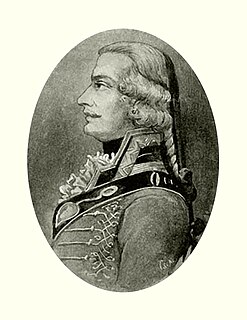
Joseph de Mesko, Freiherr von Felsö-Kubiny was a cavalry general and lieutenant-general in Austrian service during the French Revolutionary and Napoleonic wars.

Jean Jacques-Antoine Vital François de Chambarlhac was a French infantry commander during the French Revolutionary and Napoleonic Wars.
Jean-Baptiste Alexandre Baron de Strolz, 6 August 1771 Belfort, France – 27 October 1841 Paris, was a French general during the Napoleonic wars and subsequently an important political figure. He was chief of staff to André Masséna during the Italian campaign; governor of the Basilicata province; aide-de-camp to Joseph Bonaparte King of Naples and King of Spain; Baron of the First French Empire; Member of Parliament and Pair de France.

Admiral Antoine Schwerer was a French naval officer. He served in varied roles in many parts of the world, and published a number of technical papers. He rose through the ranks to become an admiral during World War I (1914–18). After retiring in 1924 he was involved with the right-wing and monarchist League of the Action Française. He was president of the League from 1930 to 1935.
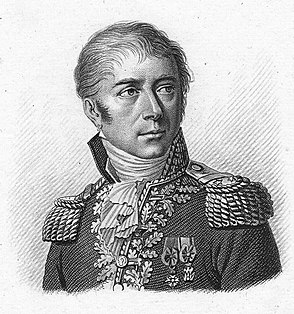
Honoré Vial was a French military leader, diplomat, and administrator who served in the French Revolutionary Wars and Napoleonic Wars.








